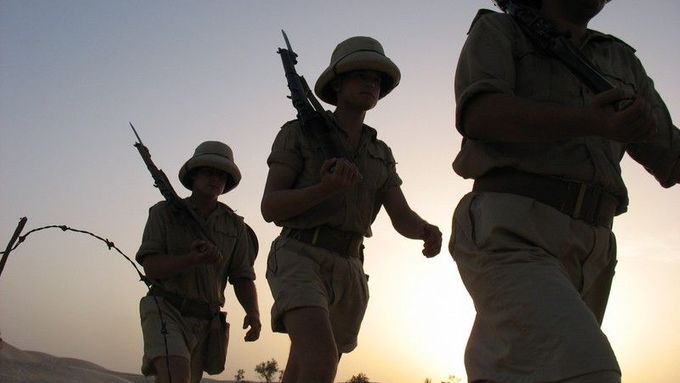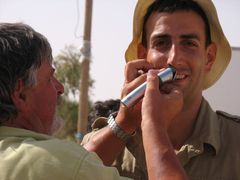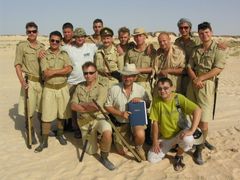Prague - Stories of Czechoslovak WWII soldiers that fought in the desert near Libyan port of Tobruk were the inspiration to director and producer Václav Marhoul for his new film Tobruk. The film premieres in the Czech movie theaters on Wednesday.
Marhoul has been working on his new film for years. Now before the premiere, he seems exhausted.
"I am sentenced to never be able to watch the film again. I have already seen it 53 times in my head. I was watching the film in my head already when I was writing the script," he says.
He says he would like to watch it in the movie theater and be surprised. "I cannot see the film objectively. I am not able to absorb it anyway no matter how positive or negative the reactions are. I wish I could disappear now," he said.
Women like the war movie
Tobruk has already premiered in Slovakia on September 4, so Marhoul already learned some reactions. "They were positive," he says, pointing out, that the film also worked with the female viewers, even though they are traditionally not that keen on war movies.
"There is no love affair involved, no female characters. Many people said that this film was not going to work with women. But after the premiere, it was women who came to me and said that Tobruk was a sad but a good film."
The film that was supported by the Czech Defense Ministry does not picture big war scenes - only one major battle takes place in its 100 minutes. The emphasis is on the everyday life of the soldiers in the desert, their nonstop waiting for the enemy and the atmosphere on the team.
"There were so many things that I wanted to communicate with this film that I am not able to describe it in one sentence," Marhoul says. But mainly he wanted to bring up emotions.
In the preparations for his film, he visited several international missions of the Czech army in Iraq, Kosovo and Afghanistan. "I have seen what war is and I have experienced the terrible fear."
No bars, just the desert
Marhoul fell in love with the desert in Africa. "The desert is like the ocean and I have fallen in love with it. I was happy there. It was really hot, there were vipers and scorpions but all we had there was ourselves and the film," Marhoul looks back.
The high level of concentration of the actors and the film crew played a crucial role for him. "There was no TV, no internet, no Čunek. The actors did not run away to do dubbing or to go to a bar," he says.
Marhoul wanted his film to have a similar atmosphere as Stephen Crane's poem about a man eating his own bitter heart in the desert. Crane's book Red Badge of Courage was also an inspiration for the film. "What remained from the book at the end was a story of a war volunteer who joins the army. His enemy is not the war, but he himself."
Director's favorite films are a Soviet war movie Come and See and British The Long Day's dying, German film Die Bruecke or Malick's The Thin Red Line.
"The US Tobruk is only full of guns and shooting. It is a total nonsense that is not based on any facts."
The film cast consisted mainly of less known actors - Robert Nebřenský as a mean corporal, and Petr Vaněk and Jan Meduna as two newcomers who come to the desert camp in the beginning of the film.
Outside the country
It is unclear what international presence the film will have. According to Marhoul, it will depend on the kind of agency that will be interested in selling the film's rights. He has already approached some agencies last year at the Berlinale Film Festival.
"I approached 40 companies out of which nine are interested in international sales of the film. They received their copy of the film last week, so most likely they will get back to us in October," he says. The director though stresses out the importance of a down-to-earth approach - every year there are 6000 films made around the world and only 400 of them are represented by sales agencies.
The success of the film also depends on its appearance at film festivals. He focuses mainly on Berlinale. "It is a young festival and we will focus all of our energy on it."
The Wednesday premiere in Prague will be followed by a series of premieres outside of the capital. Regional premieres will be combined with promotion campaigns that are meant to make the viewers more aware of the role of Czechoslovak soldiers when fighting around Tobruk.
"I want to fill in the gap in people's education on this topic," the director confesses his aspiration.
The film will be shown with English or French subtitles.


